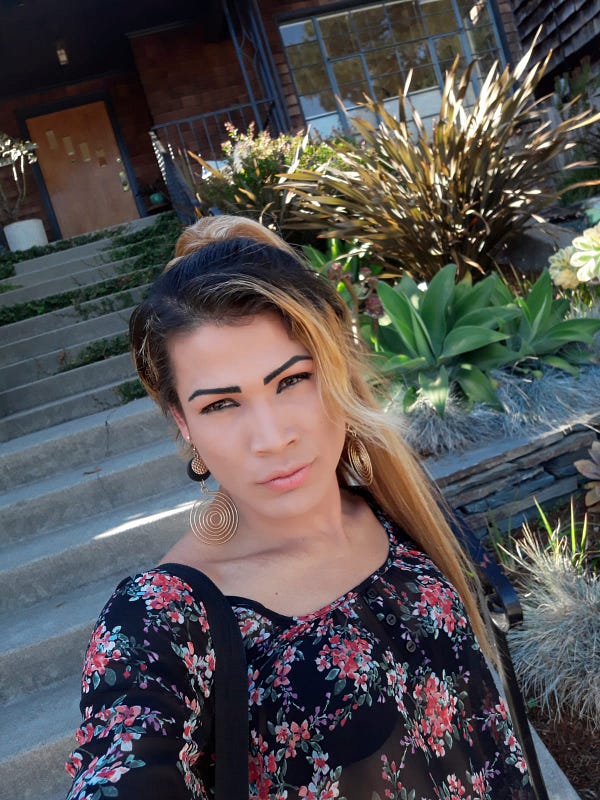This is Charlotte Alvarenga’s story, as told to me and Liz Martinez, who also translated it. Charlotte has no financial support — please consider a donation to her GoFundMe: https://www.gofundme.com/684tmls?member=886732
I never wanted to leave my country. I thought I would live there with my family and friends forever.

But I left Honduras in 2016 because I was threatened by the MS-13 gang, who wanted me to engage in drug trafficking for them. They take advantage of LGBT and trans women because we’re not taken seriously by the local authorities.
I was raped by two gang members. They hit me, said terrible things to me. It was horrific. But I couldn’t report it; I could file a claim, but the authorities work with the gangs. It’s the gangs who have the authority in Honduras — not the police. It’s something I’ll have to live with forever.
Honduras is plagued by gangs. They told me to leave my house or they’d kill me. I was given 24 hours notice. They were going to assassinate me. I saw how they’d killed others in my town and I knew they didn’t lie. I was terrified for my life, so I fled to Mexico, where I lived for about a year and a half. I sought asylum in Tapachula, but there are a lot of gangs there too. Sometimes they kill people just for fun, especially those who suffer discrimination. As a trans woman, I felt like my life was constantly in danger.
One day, when I was leaving a store, four guys got close to me and two of them grabbed my arm. They told me not to move or they’d kill me. I was forced into a taxi with them. We drove a couple blocks and got to a stop where there was a police car next to ours. I began screaming, made a scene, and managed to escape. God only knows what would have happened to me if I hadn’t.
I then moved to Mexico City and lived there for eight months. That’s where I joined a migrant caravan heading to the U.S. I was 29 years old. I became friendly with another trans woman, Roxsana Hernandez, and we traveled together. We started the journey on April 5, 2018. When we arrived in Tijuana, we were again threatened; we were told we were not welcome as trans women. On May 7th, our hostel (Caritas) was set on fire.
Our time in Tijuana was really rough. We were rejected by so many people. We were discriminated against by Mexican society and even religious groups, both evangelicals and Catholics. We were victims of homicide attempts, but thanks to God, we survived unscathed.
We sought asylum with Customs and Border Protection at El Chaparral on May 9 after waiting an entire afternoon to go inside. When we were finally allowed in, we were registered and then locked up in a hielera where we stayed five days. I was placed in a tiny room. It was freezing, but all I was given was a nylon blanket. For food, we’d be given a sandwich or burrito and juice, and then we’d be locked up again. We were allowed very little time outside and had to shower at 3 a.m. We had no idea what would happen to us, and were frightened the whole time.
My friend Roxana was HIV positive. She had a really bad cough, and despite her condition she was denied medical attention. I had a bad stomach-ache due to the food. One officer would call us “bitch,” make fun of us, and ask, “Why are you fleeing if you’re coming here sick?” We both asked to see a doctor. Finally, on the third day, they handcuffed us and sent us to a clinic in San Diego. All they did was take our vitals. We didn’t receive any medication. Later, Roxsana died at the Cibola County Detention Center. (story here: https://www.cnn.com/2018/05/31/health/transgender-migrant-dies-ice-custody/index.html)
From the hielera, I was sent to the San Luis detention center in Arizona, then to El Paso, and finally to Cibola in New Mexico.
I was detained at Cibola for 3 months. The conditions were terrible. For someone who doesn’t know English, it’s really hard. All of the guards spoke English and behaved aggressively towards us. It’s almost impossible to get medical help. You need to submit five to ten requests to see a doctor. It doesn’t matter if you’re in pain. They want you to get to the point of fainting. The food is also bad. One officer would lock us up before our time outside was up and wouldn’t give us water when we requested it. But at least I wasn’t subjected to any violence there. And Cibola has an area for trans women.
To make phone calls, I was given a card with 5 minutes and that’s all. Thankfully, we were visited by pro bono attorneys — mostly law students — twice a week and also by other organizations who worked on LGBT issues.
My pro bono attorney, Denali Wilson, is a law student in New Mexico who works for another lawyer. After 3 months, through her help and that of other pro bono attorneys, I was finally released on parole, together with fourteen other trans women. I stayed in Albuquerque for ten days and then my lawyer helped send me to the Bay Area where I could continue my case.
Now I live in Plaza Cerrito, where two hosts have provided me with a room in their house. For two and a half months, I’ve been wearing an ankle monitor. ICE told me I’d only have it for two months, but I have no hope they’ll ever remove it. It feels so uncomfortable; it’s difficult to sleep and put on my clothes while wearing it.
I don’t have any health insurance for my hormone treatments. I feel a little sick. I have an eye allergy but I can’t go to a clinic or pharmacy. I’m really limited as to where I can go because of the ankle monitor — I’m confined to a certain territory. I have to be at home every Tuesday from 8 a.m. to noon for check-ins. Sometimes they come, sometimes they don’t.
I have no financial support to survive. I have a lot of expenses, but have been told I can’t work.
But I still can’t believe I made it here. I want to have a steady job and get a place of my own. I have a lot of energy, and I’m capable of doing lots of things. When I look ahead, I feel like someday I’ll be able to start anew, and live a peaceful life without fear.

